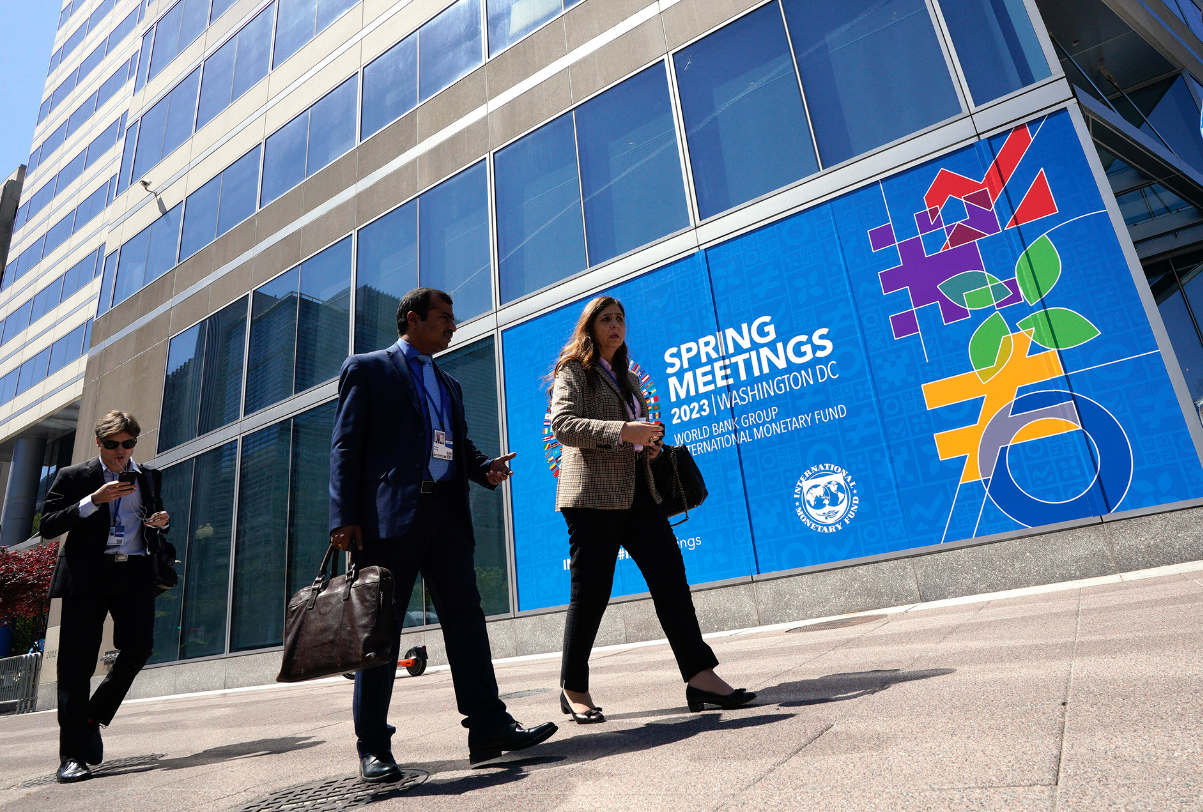The Spring Meetings, a joint annual meeting of the World Bank and the International Monetary Fund (IMF) historically associated with the world of finance, are taking place these days. However, new issues have recently become relevant, with the climate emergency occupying a prominent place on the discussion agenda. Participation in the event is also expanding. It is not only finance gurus, finance ministers, and central bank presidents who attend. Members of academia, civil society organizations, and activists also take part in the meetings in Washington.
With global temperatures rising, discussions are beginning to focus on the amount of adaptation investments, which countries should pay for them, and what financial instruments are available. Whether for adaptation works or associated with transition projects, finance is becoming central. More pressing is the need for emerging and developing countries (EDCs), a group with strong investment opportunities but highly dependent on finance. Consider, for example, the competitive advantages of these countries in terms of clean energy production, but which receive less than 10% of investments.
The World Bank’s environmental discourse is very ambitious. And the positions adopted by IMF staff also reflect concern for the issue, since they propose the need to modify behaviors and rethink tools. In this sense, they have decided to include climate in the framework of the traditional bilateral General Surveillance report — the much talked about Article 4 report that the Fund’s auditors carry out annually among member countries. The idea of stability evaluated by these reports is no longer limited to the macro-financial aspect, but also considers the climate, avoiding “green swans”. This issue is now in most of their statements, it is obviously part of their general intentions.
Most developing countries suffer from sovereign debt, a problem aggravated by the COVID-19 crisis and the subsequent crises. This means that governments end up allocating more funds to debt servicing than to health or education, a situation suffered by more than 3.3 billion people.
Meanwhile, private investors are turning away, and net fund transfers are negative: over US$ 200 billion in capital outflows in the last year. When considering the net support provided by private investors to SIDS to cope with disasters, these countries received US$ 68 billion in principal and interest repayments over and above what was provided [in fresh funds]. The same is true for the behavior of multilateral and bilateral aid agencies, which received more than US$ 37 billion in interest and principal repayments, while non-commercial fund flows continue to decline.
Meanwhile, specific funds based on Special Drawing Rights (SDRs), profusely publicized, continue to show little prominence. While the Poverty Reduction Support Fund (PRSF) disburses only US$ 3.15 billion, the Resilience and Sustainability Fund (RSF) distributes some US$ 780 million in 2023.
The commitments adopted after the Paris Agreements by the SIDS are being affected by the lack of funds, the problem of access to credit, and the lack of mechanisms to resolve debt crises. But it’s not all someone else’s fault: the attitudes adopted by those at the head of governments also play a major role. Highly exposed to extreme events and subject to the effects of climate change, many of these countries are moving ahead with oil exploration projects. Such an attitude is justified by the need for foreign exchange in the short term, although in the medium and long term the decision taken will lead to an increase in the country’s level of indebtedness.
The oil industry continues to be favored.
On the other hand, despite the recognition of the climate issue by the Bretton Woods entities, in their daily practices they end up favoring the oil industry. This sort of attitude can be observed in Guyana, as well as in Argentina. In their operations, both the Fund and the Bank continue to prioritize the restrictions imposed by the macroeconomy in the short term, instead of considering the economic and financial imbalances generated by the deepening of the oil model in the medium to long term.
The Fund’s recommendations prioritize the payment of the debt, even though the cost (subsidies, tax exemptions, reduction of withholding taxes) as well as the risks (financial) of advancing with the Vaca Muerta oil field, far outweigh the benefits. This also implies new infrastructure (gas pipelines, gas ports, etc.), the repayment of which takes decades.
Not only actions are recommended but also projects are financed. Consider, for example, the involvement of the World Bank in the Guyana offshore project: providing funds for more than US$ 55 billion. This was in 2020, one year after having committed not to finance new projects. It is worth mentioning that the contract signed with Exxon exempted this company from any liability that might arise from a hypothetical spill (a cost to be assumed by the State, a problem that ends up being borne by its population), as well as from any financial risk generated by the project. Not to mention the low level of royalties originally set, or the environmental disaster that the project generates throughout its useful life.
Repayment of the debt requires foreign currency, which sounds logical. What is illogical is to finance projects that may soon be stranded, which would aggravate the debt problem. In this sense, the profusion of oil projects is not dynamically sustainable from a financial perspective. But neither is it economically sustainable: there is little left in the country after discounting the plethora of benefits, subsidies, and exemptions granted as well as the meager royalties paid by the participating companies — aspects often forgotten by those who uncritically prioritize the development of this type of project.
*Translated by Janaína Ruviaro da Silva from the original in Spanish.












